Jump to the section
- The Impact of Artificial Intelligence in Project Management
- Key Benefits of Artificial Intelligence in Project Management
- Challenges in Artificial Intelligence Usage for Projects
- Best AI-Powered Project Management Tools
- Outlook of Artificial Intelligence in Project Management
- Will Artificial Intelligence Replace Project Managers?
- FAQs
You are in the middle of two crucial meetings. You have to prepare the project report and also deliver the minute meetings of the previous review. Now you take a call from a stakeholder who needs the latest risk analysis and resources plan for the next period. You urgently need an assistant to automate your tasks and make it easier for you to digest project information.

Welcome to the world of Artificial Intelligence in project management. The days that you need to make a project schedule manually, and make some guesses of the resources may be over. AI can support your project management activities. It can undertake scheduling activities, and task assignments automatically and free you to focus on the big picture and managing people. AI-powered with project and organization data can predict potential risks, optimize workflows, and support planning for your projects.
In this article, you will learn how project managers can benefit from AI technology. Do you want to learn about the key benefits and challenges of AI tool adoption? Do you want to learn about the best AI tools for project management?
Our goal is to make you think about how you can use AI tools to improve your efficiency as a project manager.
The Impact of Artificial Intelligence in Project Management
Automation of Routine Tasks and Processes Optimization
AI is now influencing the efficiency of project managers by automating routine tasks and optimizing project management processes. It enables project managers to focus and spend more time on strategic decision-making and high-level responsibilities. AI tools for project management are at the center of such transformation by automating and streamlining routines, project tasks, reporting, and documentation activities.
Automation of Routine Activities
AI can automate repetitive and routine processes, such as task assignment, setting a schedule, and reporting. It can handle these tasks automatically, and let you have more time for strategic and high-level planning activities. It can reduce the administrative workload and allow you to spend more time with the team and stakeholders.
Scheduling Optimization
AI algorithms take into consideration several factors concerning team availability, project deadlines, and task dependencies and automatically create the optimum scheduling. This will reduce manual errors and not-updated resource plans. This can reduce resource conflicts and help keep the project plan on track.
Task Scheduling
AI can assign and schedule tasks with the right team members by having certain information about capabilities, skills, workloads, and past performance. It can ensure, in this way, that resources are utilized in the best possible way for enhanced productivity and collaboration.
Resource Planning
AI can analyze project data and requirements, and use this analysis to find appropriate ways of efficient resource allocation. In optimizing such resource distribution, AI can prevent resource bottlenecks, and overallocation and guarantee a very efficient project flow.
Automating Status Reports
AI tools can track task progress in real-time and create status updates automatically. This would reduce manual efforts for reporting and increase the level of accuracy while reducing the risk of human error.
Document Management
AI can categorize, tag, and organize project documents. This facilitates access to important information much faster and in a structured way. This improves workflow organization by saving a lot of valuable time.
Data-Driven Decision Making
AI can heavily influence the way we make informed decisions based on data analysis. It can analyze huge volumes of data and provide actionable insights. This data-driven approach improves project decisions, resource management, and efficiency. AI can forecast and optimize decisions that can lead to measurable improvements in specific project management areas.
Scheduling Accuracy
AI tools can improve project scheduling accuracy by analyzing prior history, resource availability, task dependencies, and project deadlines. AI can generate more informed and realistic timelines. McKinsey found that companies using AI tools for scheduling activities can benefit from a 20-30% reduction in missed deadlines.
Reduced Bottlenecks
AI tools can offer predictive analytics capabilities to identify possible project bottlenecks. Including data for lack of resources and resource conflicts, AI will suggest solutions in advance to reduce project delays. This will enable the project managers to readjust resources and timelines to keep projects on track and manage stakeholder expectations.
Resource Allocation
AI improves resource allocation by analyzing skills and availability for fulfilling project requirements. According to a report from PwC, AI-driven resource management can optimize resource utilization by up to 15%. This can ensure proper team allocation and avoid overallocation or underutilization of resources for effective project delivery.
Predictive Capabilities
AI can make project managers more proactive by delivering advanced predictive analytics in the areas of forecasting, resource allocation, and risk assessment. Large-volume historical and real-time data analysis by AI tools can create insights that will enable the project manager to make more actively informed decisions to improve project outcomes.
AI systems can begin with data collection. These data can be past project information, metrics and KPIs from the current project, external factors influencing project conditions, and industry trends. This can be the basis of the predictive models for AI. By using pattern recognition, AI identifies trends, correlations, and anomalies That can support the project manager to take preventive actions early. These patterns can offer insightful knowledge in finding potential risks, and bottlenecks. In this way, the project life cycle can be optimized.
Another advantage is the real-time monitoring of data and changes in the metrics. This can provide insights and information to project managers for proper mitigations and adjustments. This can help set data-driven risk management strategies, and predict when a risk will be realized.
Stakeholder Engagement
AI can enhance stakeholder management through improved communication and transparency in the project’s life cycle. Chatbots can provide immediate information to stakeholders. Updating stakeholders about project progress through answering queries and addressing concerns. Real-time data can help them see the project metrics without asking for a dedicated report from the project manager. This will improve stakeholder satisfaction as they will have all the project information updated at any time. This enables project managers to ensure stakeholder satisfaction at any time with lower effort.
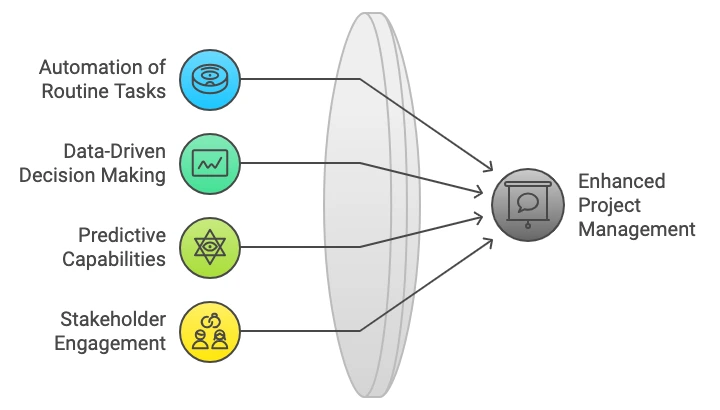
Key Benefits of Artificial Intelligence in Project Management
Increased Accuracy in Project Planning
AI can change the approach to project planning and scheduling. Data-driven insights and predictions based on previous performance can improve task duration estimations. AI will help project managers make better and data-informed decisions for project planning. This will reduce guesswork from project managers and team members and assign more predictable goals.
Data from historical performances, project retrospectives, and archives can become an asset in planning. AI can process huge volumes of information and detect patterns that are not visible to the human eye. AI can identify and warn for bottlenecks that are likely to arise. It will be possible to analyze real-time data and compare it with historical data for getting metrics performance results. The interdependencies of tasks and any data required for planning can be collected from the AI-powered tools. This will enable the project managers to focus on the big picture and drive the implementation of the vision of the projects using more reliable planning.
Enhanced Risk Management Process
AI can also assist the project manager with the risk management process. Integration of risk analysis into the planning can set some critical activities and milestones for the overall project plan. Using these activities, the project manager can estimate the reliability of the plan and check for further project and technical risks. Project managers can ask AI chatbots to make some scenario analysis and predict what would be the right mitigations for crucial risks. This will enable us to have more active management strategies to mitigate risks.
Further to identifying project planning risks, AI can support further risk identification during project executions. AI can process unstructured data in real-time, like emails, test reports, and project documentation, and suggest hidden risks that are not possible to detect. Through this real-time monitoring of project information, AI can flag a possible delay or risk before it becomes a major issue or deviation.
The biggest pain point for project managers in the risk management process is the quantitative analysis of identified risks. AI can use algorithms of machine learning to provide risk severity and impact scores, based on previous data and patterns. This will enable the project managers to focus on the top risks based on numbers.
AI can also support the risk management process through the automation of risk reports and dashboards. This will reduce the manual work for project teams to identify and assess risks. AI chatbots can ”participate” in risk identification and assessment meetings by brainstorming, worst-case scenarios and possible suggestions for project risks. This can be a great companion for project managers to overcome team members’ lack of visibility or bias for identifying and ranking project risks.
Efficiency and Productivity Gains
AI supports project management activities by handling repetitive tasks and assignments more efficiently. It can reduce bottlenecks by preventive actions or warnings. Automation of tasks, such as creating project schedules and resource allocation, can provide significant efficiency and productivity gains for project managers. Project managers can then focus on strategic decisions and leadership efforts. Therefore AI can become a significant productivity enabler for project teams through proper human-AI collaboration.
Moreover, AI tools can support the fine-tuning of tasks and resource allocation. They can get information for other project allocations and make suggestions for proper resource utilization. This can prevent underutilization or overallocation of resources. It can lead to a well-balanced task allocation enhance the overall performance of the teams and reduce delays. Task and resource dependencies are crucial factors for the efficiency and productivity of project teams. AI can continuously monitor the status of the tasks and readjust or provide advice for the optimization of the critical path. In general, the biggest benefits in the efficiency of project management will come through a combination of AI and human decision-making through data analysis.
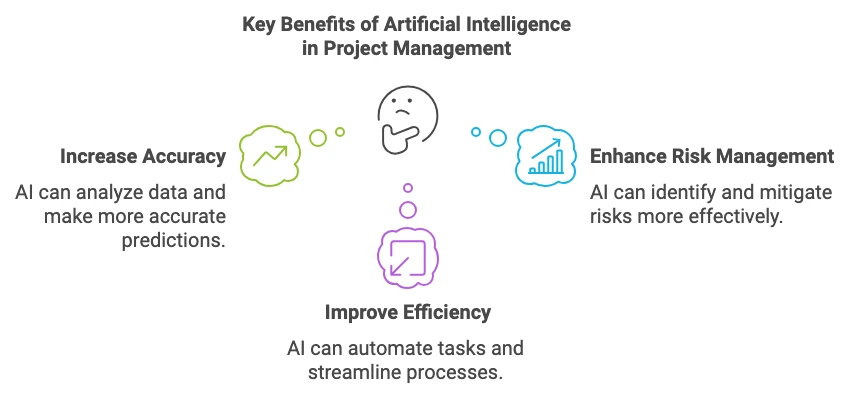
Challenges in Artificial Intelligence Usage for Projects
Integration with Legacy Systems
While AI systems used in project management can offer a lot of advantages for project teams and stakeholders, their integration into legacy systems can become challenging. The main challenge can be technical incompatibility with legacy systems and data. Obsolete legacy data or proprietary data formats that cannot be used effectively by AI systems can become an integration bottleneck. The quality and format of the legacy data can create inconsistencies and sometimes become unable to be used for the training of LLM models. This makes the training of AI tools inefficient and leads to use limitations.
Legacy systems that are not designed for AI systems lack powerful APIs (Application Programming Interfaces) for data integration. Without this architecture and APIs, the integration for smooth communication can be challenging to establish therefore limiting the AI benefits. Moreover, there can be overall issues with the performance of the legacy systems infrastructure for handling real-time data by AI applications. If the system operates slowly, crashes, or disrupts processes when working with a high volume of data, it can become a severe limitation for AI tool adoption. The real-time monitoring of data benefits cannot be realized as the legacy system cannot support such functionalities.
These challenges need to be addressed early in the AI tools integration, by upgrading legacy systems and infrastructure. Middleware solutions can bridge the gap between older systems and modern AI technology.
Data Quality and Availability
The effectiveness of AI in project management is highly dependent on the quality and access of the input data. Incomplete and inaccurate input data can lead to incorrect insights and predictions for projects. One of the key challenges is data silos that may exist in legacy systems. Such data can be not categorized or scattered and therefore can lead to incomplete data compilation from AI systems. Without the proper data quality and integration, AI-powered decisions can be challenged.
Historical data cleansing is important when dealing with historical data from legacy systems. Such data can be inconsistent or incomplete and may require to be prepared for integration with AI systems effectively. Without the proper data preparation, AI models can lead to inaccurate or misleading results. This can reduce the quality of the decision-making with the support of AI systems.
Another significant challenge for AI systems adoption can be real-time data access. Quality of the decision-making in projects relies mainly on up-to-date information for dynamic and real-time adjustments during project execution. Older systems may not be designed to support the frequent data retrieval required for AI-assisted tools.
Security and Compliance Concerns
AI tools and systems integration can pose big security concerns and must be addressed carefully. Outdated security protocols can be one primary risk for AI tool integration. Older legacy systems, designed years or decades ago, can be outdated for security. After integration with AI tools, vulnerabilities can be exposed. This may increase the risk of data breaches or cyberattacks. AI systems require seamless data flow, and any gaps in infrastructure can put sensitive project data at risk.
Another key challenge is how to remain compliant with continuously evolving data protection regulations. Many industries such as healthcare or finance, have strict compliance requirements for handling customer-sensitive personal data. Integration of AI-powered tools with older systems can raise compliance issues, especially when legacy infrastructure is outdated. Failing to comply with regulations such as GDPR or HIPAA can result in significant penalties and damage to an organization’s reputation.
For addressing such security and compliance concerns a thorough evaluation of both legacy systems and AI platforms is required. Adopting proper data encryption, authentication and data protection can reduce security and compliance risks. Upgrading security protocols and having thorough audits, can ensure proper and safe AI-Tools integration in project management without any compromise in security or compliance.
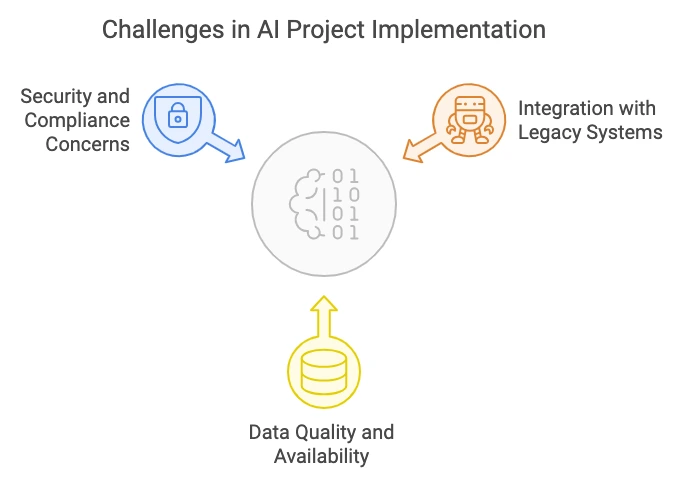
Best AI-Powered Project Management Tools
Having the right AI tools for your projects is an important choice. We provide here the best leading AI tools for project management. The following AI-powered tools can also support the risk management processes. Such tools offer sophisticated AI features for risk identification and resource allocation. Such tools analyze real-time data and have predictive insights for automating key processes for risk and resource management.
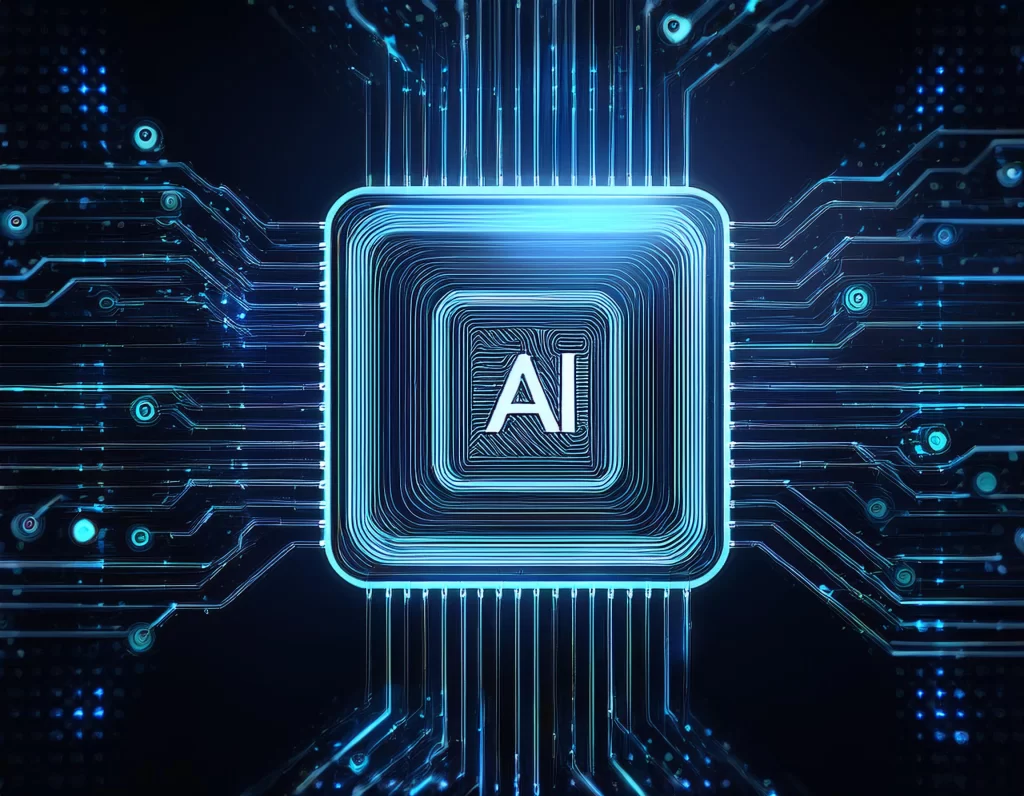
ClickUp.com
ClickUp is a versatile project management platform with advanced AI capabilities. It can automate task management, assigning and prioritizing tasks based on team capacity and project needs. With smart scheduling features, ClickUp optimizes timelines and resource distribution. It also offers predictive analytics capabilities for project outcomes forecasts and identification of potential risks.
Notion.so
Notion uses AI capabilities to create a highly adaptable workspace for project management. With its AI-powered writing assistant, it can provide drafts of project documents. Using smart databases can organize and connect project information dynamically. It can automate workflows and processes based on specific project needs.
Asana.com
Asana is a very well-known project management tool, which integrates AI capabilities for improving task prioritization and workflow efficiency. By analyzing project goals and deadlines, Asana can suggest task priorities and balance team resource allocation. It offers predictive search functionalities and also enables users to easily find project-related information.
Wrike.com
Wrike is designed for enterprise-level project management and offers AI-driven insights to optimize resource management and risk analysis. Its AI capabilities can include predictive risk identification and automated reporting. It can offer real-time data to support project managers with data-informed decisions.
Forecast.app
Forecast is an AI-native tool for project management for supporting data-driven decision-making. Using historical data it can automate project planning. Then it can optimize resource allocation based on team skills and availability. It can provide project business cases using predictive analytics and provide potential issues.
Liquidplanner.com
Liquidplanner uses AI features for risk management processes. It aims to predict potential project delays, task dependencies, and resource constraints. Its scheduling features automatically adjust timelines based on real-time data. This ensures that projects are staying on track while effectively managing resources.
Smartsheet.com
Smartsheet uses AI to improve resource allocation using team capacity and availability analysis. It helps to identify vulnerabilities and potential risks, disruptions, and issues. This allows project managers to take predictive steps to mitigate risks. It is also streamlining workflows and ensuring they are optimally allocated along different tasks.
Outlook of Artificial Intelligence in Project Management
The future of AI in project management will focus on how the projects are tracked, managed, and optimized with a high degree of automation. The AI-powered project management tools will continue to offer advanced features for more precise tracking, real-time data monitoring, and improving predictive capabilities.
AI will offer organizations more autonomous project management tools. These tools will offer comprehensive project management capabilities with minimal human intervention in specific areas. This autonomy will focus on planning, resource allocation, and risk management activities. Another important area of project management for AI tools is stakeholder management. Sentiment analysis algorithms will be used to measure and evaluate stakeholder satisfaction and engagement in real-time.
Even if AI offers more automation and autonomous planning and rescheduling, human oversight will remain rather crucial. Especially in strategic and complex decision-making and risk management in larger and more complex projects. AI can offer improved efficiency, automation, and data analysis. However, project managers will still be required to assess the strategic direction and people-related management activities.
Therefore the future of AI-assisted project management will take a more hybrid approach. AI and human collaboration could improve project efficiency. AI tools will take over repetitive tasks, data-driven activities, and data analysis. Project managers will focus on oversight, strategic decision, team and stakeholder management. This hybrid approach will offer significant benefits by minimizing human errors in routine tasks and allowing for more frequent repetition and corrections. AI will support project managers to handle the workload and allow them to develop their people and strategic skills.
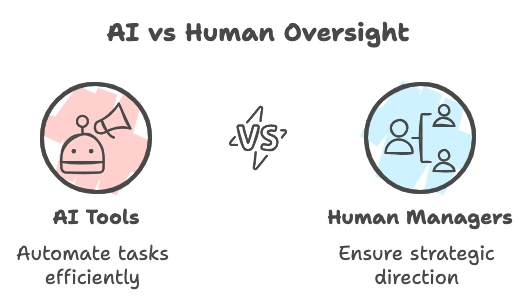
Will Artificial Intelligence Replace Project Managers?
The development of AI and its use in project management activities has raised a lot of questions and concerns about the future needs of project managers. The reality and prognosis are that AI will be more of an assistant rather than an autonomous project manager. Project managers will be there to drive decisions that need strategic insights, ethical consideration, and people management skills. This will allow project managers to focus more on leadership and activities requiring human intuition and creativity.
AI-human collaboration in project management will enhance project managers’ capabilities, efficiency, and accuracy. AI will provide insights that will allow project managers to steer the projects more efficiently. Human expertise and emotional intelligence are always required for successful project delivery. The solutions are coming from people, and the project manager will need to focus on team management to achieve and deliver results. Change management requires people, emotional, and cultural-related considerations. These activities require a high level of empathy, creativity, and adaptability in people-oriented situations that AI cannot offer.
By leveraging AI as a powerful assistant and data analyst, project managers will become more efficient and productive. Project management will always require a human touch to be effective and successful.
FAQs
No, AI will not replace project managers. Instead, it complements them by automating routine tasks like scheduling and data processing, allowing project managers to focus on high-level decision-making and leadership. Human creativity, emotional intelligence, and intuition are essential for tasks that AI cannot handle.
AI improves efficiency by automating repetitive tasks such as task management, resource allocation, and reporting. It provides data-driven insights that help project managers make faster and more informed decisions, reducing the potential for errors and improving overall productivity.
The main benefits include increased accuracy in project planning, better risk management, optimized resource allocation, enhanced decision-making through data-driven insights, and improved scalability by handling more complex projects without additional resources.
Yes, AI tools can identify potential risks early by analyzing project data, performing quantitative risk analysis, and offering predictive insights into possible outcomes. AI helps project managers develop effective risk mitigation strategies by continuously monitoring project progress.
Project managers can collaborate with AI by using it to automate routine tasks while focusing on more strategic roles such as stakeholder management, team leadership, and complex problem-solving. AI acts as a tool to enhance their capabilities rather than replace them.
